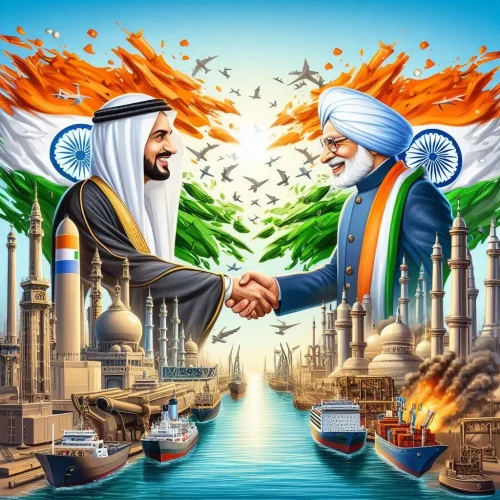Relations Challenges Between Kuwait and India are multifaceted, marked by deep historical ties, economic interdependence, and cultural exchanges. However, this relationship also faces significant challenges that must be navigated carefully to ensure mutual growth and stability. Key among these challenges are regional instability and economic dependence. Understanding and addressing these issues are crucial for fostering stronger bilateral relations between the two countries.
1. Regional Instability Affecting Relations Between Kuwait and India
Regional instability in the Middle East significantly impacts the relations between Kuwait and India. The Middle East is a region fraught with political tensions, conflicts, and power struggles. This instability impacts the entire region, including Kuwait, which in turn influences its foreign relations, particularly with India.
1.1 Impact on Trade and Security in Kuwait and India
- Trade Disruptions: Regional conflicts often lead to disruptions in trade routes and supply chains. For instance, conflicts in the Gulf can affect the transportation of goods and oil, crucial to both Kuwaiti and Indian economies.
- Security Concerns: The instability poses security threats to expatriates, including the large Indian community in Kuwait. Ensuring the safety of these expatriates is a priority for both countries, impacting diplomatic and economic decisions.
1.2 Diplomatic Strains in Relations Between Kuwait and India
- Aligning Interests: Kuwait and India sometimes find themselves in a difficult position to align their foreign policies with those of regional powers. This balancing act can create diplomatic strains, especially when their interests diverge.
- International Pressures: Both countries face international pressures to take stances on regional conflicts, which can complicate their bilateral relations. Navigating these pressures requires diplomatic finesse and strategic planning.
How Kuwait and India Are Dealing with Regional Instability
- Collaborative Diplomacy: Kuwait and India engage in continuous dialogue to align their policies and strategies. This collaboration helps in mitigating the adverse effects of regional instability.
- Security Agreements: Both countries have entered into security agreements to protect their citizens and interests. These agreements facilitate better coordination and response to security threats.
- Trade Diversification: By diversifying trade routes and sources, Kuwait and India reduce their vulnerability to regional conflicts. This strategy ensures the continuity of economic activities despite regional disruptions.
2. Economic Dependence Affecting Relations Between Kuwait and India
Economic dependence is another significant challenge affecting the relations between Kuwait and India. The economies of both countries are intertwined, particularly in the energy sector, labor market, and trade.
2.1 Energy Sector Dependence in Kuwait and India
- Oil Imports: India heavily depends on oil imports from Kuwait to meet its energy needs. This dependence makes India vulnerable to fluctuations in oil prices and supply disruptions.
- Investment in Energy Projects: Kuwaiti investments in Indian energy projects are substantial. While this boosts India’s energy infrastructure, it also creates a dependency that can be risky in times of economic downturns.
2.2 Labor Market Dynamics in Kuwait and India
- Expatriate Workforce: A significant number of Indian expatriates work in Kuwait, contributing to the Kuwaiti economy. This labor migration is crucial for both countries but also creates economic dependencies that require careful management.
- Remittances: Remittances from Indian workers in Kuwait are a vital source of income for many families in India. Any economic instability in Kuwait can affect these remittances, impacting the Indian economy.
2.3 Trade Imbalances Between Kuwait and India
- Export-Import Dynamics: The trade relationship between Kuwait and India is marked by imbalances. While India exports a variety of goods to Kuwait, the volume of oil imports creates a trade deficit. Managing this imbalance is essential for sustainable economic relations.
- Diversification of Trade: Both countries are working towards diversifying their trade portfolios. By expanding into other sectors such as technology, healthcare, and education, they aim to reduce economic dependence on a few key areas.
How Kuwait and India Are Addressing Economic Dependence
- Economic Cooperation: Kuwait and India have established various economic cooperation mechanisms. These include joint ventures, investment agreements, and trade pacts that promote balanced economic growth.
- Skill Development Programs: To address labor market dynamics, both countries are investing in skill development programs. These programs aim to equip workers with skills that are in demand, reducing economic vulnerabilities.
- Bilateral Trade Agreements: By negotiating and signing bilateral trade agreements, Kuwait and India seek to create a more balanced and diversified trade relationship. These agreements facilitate smoother trade flows and reduce economic dependence on specific sectors.
Tech Challenge
The integration of technology into the commercial relationship between Kuwait and India is a crucial factor for future growth. However, both nations face significant challenges in leveraging advanced technologies to enhance their trade and investment practices.
- Digital Infrastructure: Developing robust digital infrastructure is essential for facilitating efficient trade and commerce. Ensuring secure and efficient digital payment systems, e-commerce platforms, and logistics technologies can streamline bilateral trade.
- Cybersecurity: As trade and commerce increasingly rely on digital platforms, cybersecurity becomes paramount. Protecting sensitive business information and transactions from cyber threats is a challenge that both countries must address collaboratively.
- Artificial Intelligence and Automation: Leveraging artificial intelligence and automation can significantly enhance productivity and efficiency in various sectors, including manufacturing, supply chain management, and customer service and modern AI tools such as advanced robotics, AI-driven analytics, automated customer service systems, and additional AI technologies and tools that could be found in AiForEveryone. This is particularly relevant for the economic relations between Kuwait and India, where advanced technologies can optimize trade and business operations. However, integrating these technologies requires substantial investment and workforce training.
Conclusion
The challenges affecting relations between Kuwait and India, such as regional instability and economic dependence, require strategic handling. Through collaborative diplomacy, security agreements, and economic cooperation, both countries are working towards mitigating these challenges. By diversifying trade and investment and addressing technological challenges, they aim to build a more resilient and balanced relationship that benefits both nations.





